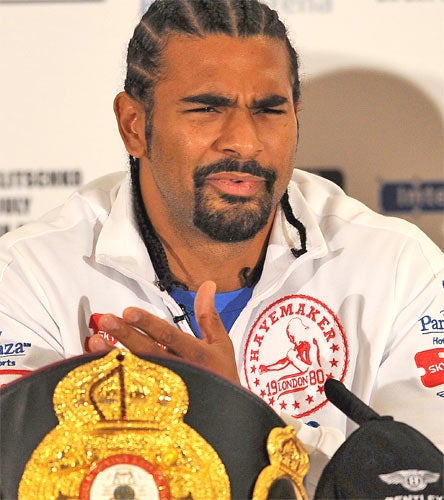James Lawton: Cooper was a contender – Haye has never met one
Even on the apparently foolproof ground of a dedication to the brave and conspicuously decent Cooper, Haye manages to produce a churning in the stomach

Your support helps us to tell the story
From reproductive rights to climate change to Big Tech, The Independent is on the ground when the story is developing. Whether it's investigating the financials of Elon Musk's pro-Trump PAC or producing our latest documentary, 'The A Word', which shines a light on the American women fighting for reproductive rights, we know how important it is to parse out the facts from the messaging.
At such a critical moment in US history, we need reporters on the ground. Your donation allows us to keep sending journalists to speak to both sides of the story.
The Independent is trusted by Americans across the entire political spectrum. And unlike many other quality news outlets, we choose not to lock Americans out of our reporting and analysis with paywalls. We believe quality journalism should be available to everyone, paid for by those who can afford it.
Your support makes all the difference.David Haye says he will make his fight with Wladimir Klitschko a tribute to the late Sir Henry Cooper. A piece of hype, no doubt, but immeasurably less offensive than some of his material last time out when he was preparing to meet Audley Harrison and likened arguably the most egregious collision in the history of heavyweight title boxing to a gang rape.
He also said he would violate the fighter who had not so long before been beaten by a Belfast taxi driver.
Within the ropes, of course, the most significant violation, inevitably, was to the memory of heavyweights who fought contests which were not the outrageous insult to the fight public that each one of Haye's forays into the division have so shamelessly represented.
But then even on the apparently foolproof ground of a dedication to the brave and conspicuously decent Cooper, Haye manages to produce a familiar churning in the stomach. He points out that Cooper never won a world title and that this invests even more value in his dedicating of the Hamburg fight to the man whose brilliant left hook reduced the then Cassius Clay to such disarray he needed more than the statutory minute's break to recover and retrieve the most dazzling, burgeoning aura in the history of the ring.
No, Cooper never won the world title but he fought for it when it meant more than a series of fights which in Cooper's day would have had the essential appeal of a mugging down some dark alley. The Harrison fight was an abomination, an event so shameless that the most remarkable aspect was the willingness of the British boxing board to waive its right to withhold the loser's purse.
Cooper wasn't big enough, good enough or in possession of the right skin tissue and bone structure to win a title owned in those days by such successors to Rocky Marciano as Floyd Patterson, Sonny Liston and the Muhammad Ali who put aside his slave name Cassius when he disposed of the menacing Liston.
Cooper's colourful, knowing manager Jim "The Bishop" Wicks said he thought too much of "Enery" to put him in with the menacing Liston, but Cooper fought Ali twice, beat the American top-liner Zora Folley, before a brutal denouement in their second fight, and was beaten by Patterson when the former champion was coming down from the top of the hill.
Such is the thumbnail sketch of a man beloved of the British boxing fans, a man of unfailing charm and dignity who knew his limitations but was never afraid to go to the very edge of them.
Now Haye says he expects to be joined in spirit as he attempts to do again something beyond the reach of the fallen national hero. Haye makes his connection, and his gesture, on the back of four heavyweight fights which in Cooper's day would have brought nothing but the deepest reproach.
The first of them was against the ageing Monte Barrett and was the American's fourth of six defeats in nine fights. Then there was the giant Nikolai Valuev, whose inability, or perhaps it was disinclination, to throw a serious punch was accompanied by an immobility that would have made an elephant look blessedly adroit.
Next came John Ruiz, who looked bad a decade earlier when labouring against an Evander Holyfield whose mere presence in the ring had become a matter for widespread alarm. Harrison has already been discussed.
It is some credit to Haye that eventually he agreed to fight the 35-year-old Klitschko, a rare, serious heavyweight in these deeply diminished days. A tribute to Cooper which had a vestige of meaning would, it is hard not to believe, have properly awaited the outcome of this interesting development in the heavyweight career of David Haye.
Join our commenting forum
Join thought-provoking conversations, follow other Independent readers and see their replies
Comments